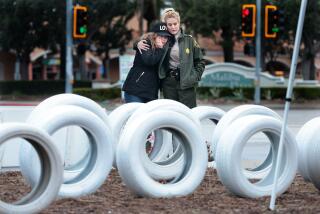California’s new cycling ‘three-foot rule’ stirs some ‘reader rage’
On Sept. 16, 2014, California will join nearly half the states in requiring cars to keep at least a three-foot distance from bikes that they pass on the road. Commenters on our blog posts and news stories that covered the signing of the bill reveal joy, vindication, anger, resentment and misunderstanding among cyclists and drivers. Times letters editor Paul Thornton cited a few in a post Wednesday that highlighted some of the tension; it’s worth a look.
There are more, and they raise the question: Do cyclist, drivers, walkers and others really think so little of one another, or do they just have a good time ginning up the invective when they lash out anonymously online?
Here’s a sampling beyond those already spotlighted:
From “billdsd”:
“I always find it hilarious that some motorists feel that they are being so terribly disadvantaged.Is passing at a safe distance really that difficult? Does your steering wheel not work?”
From “straightspeaking”:
“Cyclists need to exhibit commonsense and courtesy -- not smug arrogance -- when riding.”
From “astrobob1”:
“Will somebody please make these arrogant and reckless bikers obey the STOP SIGNS. Since they do not have plates on their bikes, maybe we should tatoo a license number on their arms!!!! So that they can be reported and arrested.”
Some of the same commenters, and many others as well, weighed in on the news story by our Times colleagues Melanie Mason and Patrick McGreevy.
From “dpenpaper”:
“This sounds like another law ready-made to gather revenue. I was fined $109 for walking across the street too slowly; what’s the bite for this law?”
For the record, it’s a $35 ticket for a driver who overtakes a cyclist on the road with less than a three-foot space between them or -- in the alternative, if a three-foot buffer is not possible -- at a speed that is “reasonable and prudent.”
It’s $220 if a violation of the three-foot rule causes a collision that in turn causes injury to the cyclist.
I’m not sure that sounds so onerous. As with most traffic laws, it seems that the idea is more to raise awareness of a safer practice than to rake in money from fines. I wouldn’t say the same for parking meter violations, for example; politicians and other city officials have been pretty straightforward about raising fines and restricting parking to raise revenue.
There is a full year before the law takes effect.
I opposed this law when I first heard about it in 2008, because how could I, while driving my car, control whether some crazy outlaw cyclist pedaled within three feet of me? Why should I be liable for that? Not fair! But then I actually read the law. Here’s the one that passed and was signed.
It’s really not that much of a change from the current law, which requires drivers to pass at a safe distance. But what’s a safe distance? If we couldn’t figure it out before, it’s now figured out for us: At least three feet.
Other commenters opened up the long, not-so-new but still current list of issues surrounding shared street use, such as: When can you ride your bike on the sidewalk?
We’ll definitely be getting back to that one.
ALSO:
A cyclist asks: What are the rules of the road?
Is 3 feet for cyclists too much to ask? Readers weigh in
Victory for California cyclists: Riders get their three-foot cushion
This post is part of an ongoing conversation to explore how the city’s cyclists, drivers and pedestrians share and compete for road space, and to consider policy choices that keep people safe and traffic flowing. For more: latimes.com/roadshare and #roadshareLA.
More to Read
A cure for the common opinion
Get thought-provoking perspectives with our weekly newsletter.
You may occasionally receive promotional content from the Los Angeles Times.











